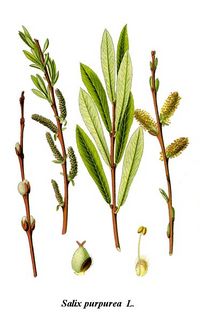Purple Willow
| Salix purpurea subsp. var. | Purple Willow, Purple Osier | |||||||||||||||||||||||||||||||||||||||||||||||||||||||
|---|---|---|---|---|---|---|---|---|---|---|---|---|---|---|---|---|---|---|---|---|---|---|---|---|---|---|---|---|---|---|---|---|---|---|---|---|---|---|---|---|---|---|---|---|---|---|---|---|---|---|---|---|---|---|---|---|

|
|
| ||||||||||||||||||||||||||||||||||||||||||||||||||||||
| ||||||||||||||||||||||||||||||||||||||||||||||||||||||||
| Standard Cyclopedia of Horticulture |
|---|
|
Salix purpurea. (S. Forbyana, Smith. Vetrix purpurea, Rafin.). Purple Osier. A shrub or small tree, spreading at base, with long, flexible branches: lvs. oblanceolate, serrulate, glabrous, veiny, 3-6 in. long, often appearing opposite: aments sessile, slender; pistillate recurved; scales purple; stamen 1: caps. small, ovate. Eu.—Planted as an ornamental shrub and escaped in many places. Also grown as a basket-willow. Var. pendula, Dipp. (S. nigra pendula, Hort. S. Americana pendula, Hort.). Branches pendent. Var. lambertiana, W. D. Koch. Lvs. broader, generally obovate-lanceolate, more abruptly acuminate, usually more rounded at the base, up to 4 in. long and 3/4 in. broad. Var. sericea, W. D. Koch. Lvs. silky when young, becoming glabrous. Here belongs the "Kecks Willow" (var. Kecksii, Hort.). Var. amplexicaulis, Boiss. Lvs. sessile or subsessile, cordate or rounded at the base, acuminate, oblong to oblong-lanceolate, glabrous.
|
Cultivation
- Do you have cultivation info on this plant? Edit this section!
Propagation
- Do you have propagation info on this plant? Edit this section!
Pests and diseases
- Do you have pest and disease info on this plant? Edit this section!
Species
Gallery
If you have a photo of this plant, please upload it! Plus, there may be other photos available for you to add.
-
photo 1
-
photo 2
-
photo 3
References
- Standard Cyclopedia of Horticulture, by L. H. Bailey, MacMillan Co., 1963
External links
- w:Purple Willow. Some of the material on this page may be from Wikipedia, under the Creative Commons license.
- Purple Willow QR Code (Size 50, 100, 200, 500)
